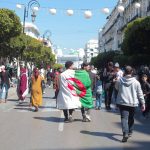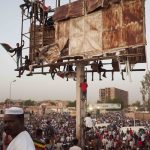How Sudan’s revolution affected football
The protests that saw former Sudanese president Omar al-Bashir removed from power also led to the suspension of domestic football and teams being forced to play outside the country.
Author:
14 August 2019

The peace agreement signed by Sudan’s generals and protest leaders was welcomed by the country’s citizens, especially football fans who have been hit with a double blow after months of violence and uncertainty that spilled into the beautiful game.
For the past seven months, Sudanese people marched for freedom in what was described as the strongest revolution in the country’s history after similar events in 1964 and 1985. On 11 April this year, former president Omar al-Bashir was overthrown after almost three decades in power. This was after millions of people protested, staging a sit-in at the military headquarters in Khartoum as a transitional military council was established to pave the way for civilian rule.
However, that also caused unrest until the peace agreement was signed. The country has suffered on all fronts, with the people even denied the escape of football, which was described as Sudan’s “only source of joy”.
Related article:
Al Hilal Omdurman, a club that had so much ambition for continental glory in the 2018-2019 season, were the first team to be affected directly when they received a letter from the Confederation of African Football (CAF) barely 24 hours after al-Bashir was ousted. The administrative body for African association football told the club they would not be allowed to host the return leg of the CAF Confederation Cup quarterfinal against Tunisian side Etoile Sportive du Sahel on 14 April in Khartoum owing to “security reasons”.
Suddenly, the mood changed. Yes Al-Bashir was gone, but this game meant everything for the Al Hilal faithfuls, especially after losing 3-1 in Sousse. Being stripped of their home advantage meant that a comeback against the Tunisian giants was almost impossible. Another dream was about to end.
Stripped of home advantage
A few hours before the CAF’s decision, a video had emerged from the Al Hilal camp of players celebrating the change in power. The mood was festive. Sudan had finally experienced some joy after four months of continued protests. Although the people wanted a full civilian government, what they got made it feel like the revolution was going in the right direction. It was the perfect time to host Etoile.
A member of the ultras said at the time, “We are so confident of progressing to the semifinal, 60 000 fans will be present. We are ready to topple Etoile du Sahel the same way we toppled Al-Bashir.”
Al Hilal ended up hosting Etoile in Suez, Egypt, on 23 April. The CAF only allowed 200 Sudanese supporters to attend the game. Al Hilal lost 2-1 (5-2 on aggregate). Things went downhill after that for Sudanese football. Although Al-Bashir was gone, it felt like the revolution had just begun. The transitional military council refused to hand over power to a civilian government. They ordered armed forces to chase away protesters and shut down the sit-in, causing further unrest.
Related article:
This resulted in the Sudan Football Association suspending all footballing activities in the country on 2 May, with just seven weeks left in the league season. It was a difficult situation to deal with initially. Sudanese people eat, sleep and breathe football. Although they haven’t had many successes to boast about in recent history, the passion is ever present, the stadiums are always full and the rivalry never dies. CAF was, after all, founded in Khartoum in 1957 with Sudan, Egypt, Ethiopia and South Africa as the four founding members.
Clubs were forced to release players from camps, which made it tricky to monitor them at a time when the league was at such a crucial stage and could resume at any time. Sudan Football Association president Kamal Shaddad said in an interview with Sudan TV that “the league could resume at any time and CAF have warned us that we must conclude the league in order to have participants in next year’s club competitions”.
The deadline for naming participants was 30 June. The league resumed nine days before that, when it was deemed safe to do so after 50 days behind closed doors. In nine days, all the clubs had to play their seven remaining league games so that Sudan would have representatives in the Champions League and the Confederation Cup.
Foreign players forced back home
“I can’t come back, I don’t feel safe,” said Al Hilal’s Congolese striker, Idriss Mbombo, after staying in Sudan for a month during the protests. He rarely left his apartment in Khartoum. Mbombo eventually managed to travel to Zambia to see his family. He refused to come back to Sudan despite having a contract with Al Hilal until December 2020.
Majid Soumana, a midfielder from Niger, was forced to mutually terminate his contract with Al Merrikh despite being a key player for the team. At times, the airport had to close for security reasons and many players thought they would never see their families again.
In preparation for the new season that starts on 15 August, some clubs have found it difficult to convince foreign players to come and play in Sudan. Hassan Ali Eissa, the general secretary at Al Hilal Omdurman, said, “The insecurity and internet blackout has made it difficult for us to register new professional players on the transfer market system. We have been forced to enter the market and start negotiations very late and therefore missed the opportunity to sign specific players. It is going to be very difficult for us to compete.”
Financial struggle
To rescue the situation, the Sudan Football Association with the CAF’s permission managed to extend the season until 6 July. The association decided that all the games would be played in Khartoum with three stadiums hosting the matches. This resulted in poor attendance and little revenue for most clubs, especially those based outside the capital.
Meanwhile, the country was mourning the loss of 230 civilians who had lost their lives during the revolution. Most people found it disrespectful for a ball to be kicked with the blood of Sudanese people still visible on the streets of Khartoum. That’s why those matches were poorly attended.
Games were played every 48 hours. Injuries occurred frequently as players were not physically ready to handle such pressure. Player salaries and bonuses were delayed. Some players have not been paid in months even though a new season is about to start.
Related article:
The change in government has affected some clubs directly. They include Khartoum Al Watani and Ahli Khartoum, which were funded by the national intelligence and security services under the former regime. Hilal El-Obied, a team ever so present in the CAF Confederation Cup in recent years, was also heavily funded by former government official Ahmed Mohammed Haroun, who is rumoured to be in jail now for corruption. He is also wanted by the International Criminal Court for crimes against humanity.
Sudan Football Association adviser Mazin Abu-Sin said, “The recent political situation has indeed had a huge impact on Sudanese football. Many clubs were funded by former government officials and now it is evident. There are no independent revenues funding most Sudanese clubs. Clubs did not want the league to resume, they are unable to handle the financial burden at the moment.”
Derby day
The last day of the season, 6 July, Al Hilal versus Al Merrikh. In Sudan, you are either blue for Al Hilal or red for Al Merrikh. The rivalry has always been intense, but this one just didn’t feel the same.
A half-full stadium greeted the clash for the first time in decades. There was limited coverage and a lethargic performance from both sides. The game ended in a goalless draw, allowing the Red Devils to clinch the title. The two clubs got tickets to play in the Champions League.
Related article:
Al Merrikh will host JS Kabylie on the weekend of 23 to 25 August in the preliminary round after making the trip to Algeria for the first leg. Al Hilal will host Rayon Sports in the second round, having travelled to Rwanda for the first leg.
Al Ahly Shendi and Al Khartoum are doing battle in the Confederation Cup. They are also playing the second round at home.
Hosting these matches is a significant move towards bringing normality to Sudan.
The future
Madaniyaaaa (civilian) is a word that is being echoed around the country. The people of Sudan say that everything can be achieved in due time with a civilian government.
For a country that helped establish football in Africa in the 1950s, Sudan doesn’t have much to show for its rich history as a result of poor management and corrupt officials.
There is hope that the new dispensation, a civilian-majority sovereign council that will lead Sudan through a transitional period of three years, will result in the appointment of competent personnel to take charge and help fulfil the potential of this glorious footballing nation.




